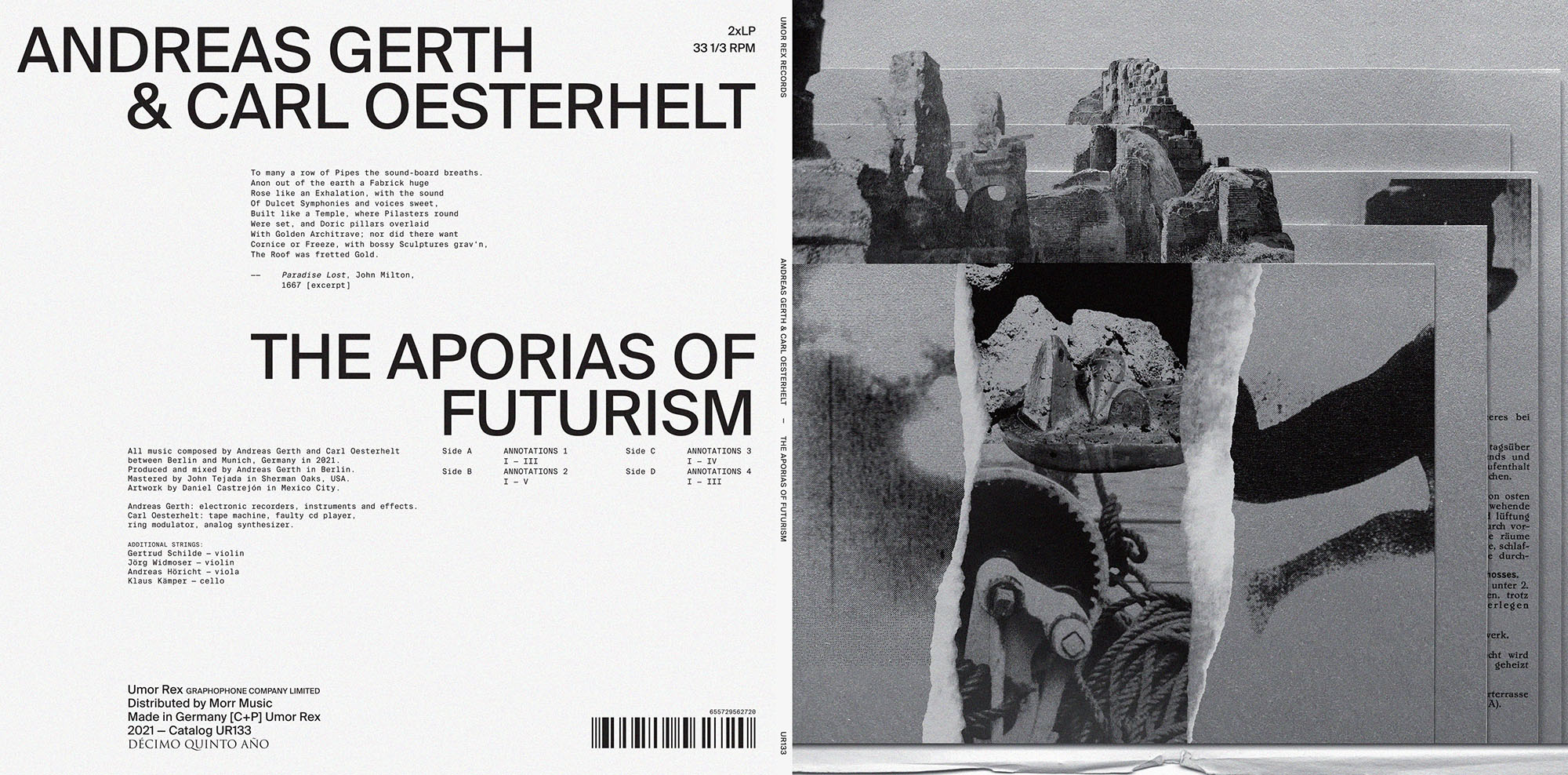THE APORIAS OF FUTURISM… FINALLY OVERCOME!
Andreas Gerth & Carl Oesterhelt present a masterpiece.
With great gesture, the Futurist tried to eliminate all art more than 111 years ago: „We ...“, Filippo Marinetti claimed in pluralis majestatis in a daily newspaper, „... want to destroy the museums, the libraries and the academies of every kind and fight against moralism, feminism and every cowardice based on expediency and self-interest.“ The project of futurism failed late because of total success. In December 2021, Marinetti‘s loveless, war-glorifying sound collage „BOOOOOMBOOOMBA AAAARDAAAMENTO. BUM BUM BUM. ZANG TUMB TUUUM,“ consisting of little more than these words pasted onto paper, successfully sold at auction at Sotheby*s for exactly 138.600 euros. The unsigned, mass-printed newspaper page on which Marinetti wrote his Futurist manifesto quoted above on February 20, 1909 in Le Figaro, brought only € 20.160, but will continue to grace some „museums, the libraries and the academies of every kind“.
![]()
BUM BUM BUM! Despite all this! They still exist, the good avant-gardists!
Even if in the year of the Lord 1962 — for a long time there was nothing to be seen or heard too much of avant-garde in Germany — the then still emerging lyricist Hans Magnus Enzensberger („Defense of the Wolves“) published an essay that wanted nothing less than to finally declare the avant-garde lost and ended. Enzensberger‘s text, now iconic itself, was called „The Aporias of the Avant-Garde.“ It begins with the derisive sentence, „To reckon oneself avant-garde is up to anyone who colors empty spaces, puts letters or notes on paper,“ and it culminates 29 pages later in the verdict: „Every avant-garde today is repetition, deception, or self-deception.“
Enough of history. When today — almost 60 years later — the two musicians Andreas Gerth & Carl Oesterhelt release a double album called „The Aporias of Futurism“, they defiantly counter Enzensberger‘s verdict a human age later with a work that is amazingly pleasant to listen to, which, in addition to Futurism, finally puts other avant-gardes such as Fluxus, Andy Warhol, Joseph Beuys, New Music, Punk and Postmodernism to the files (and files Enzensberger‘s false essay right next to it under „pointess“).
![]()
Just as Enzensberger cultivates his ressentments towards the avant-garde, Carl Oesterhelt cultivates his aversion to music-making computers and other products of modernism (he can only be reached by telephone via a — not always active — Munich landline). He keeps the greatest possible distance from any kind of cultural enterprise (be it that of pop or classical music): „There are few,“ he once revealed to the daily newspaper TAZ, „who, like me, make classical music without the structures of classical music.“ Perhaps he is even the only one. Asked by me to say something about the „Aporias of Futurism,“ he politely and immediately responds by sending a recording of Gottfried Benn speaking into the gramophone in 1931, when his oratorio „Das Unaufhörliche“ (music: Paul Hindemith) had its premiere.
Benn‘s introduction states: „We feel just like everyone else the current dissolution milieu in which we stand, the slipping away of many social, religious, and cultural ties, and if we asked ourselves in what milieu we actually live, we found [...] a milieu with a particularly pronounced sense of the ceaseless change of all being.“ — Carl Oesterhelt added happily: „We don‘t even need to add our two cents“. And his companion Andreas Gerth agrees, „In 1931, this was a statement of almost prophetic power. The unmistakable sense of decline is still euphemistically interpreted as ‚change‘ in Gottfried Benn‘s libretto. ‚Eternally in flux and in flux great,‘ it says. That seems very topical to me. It‘s true, that was also the background noise in making our music, only we didn‘t have such beautiful words.“
Carl Oesterhelt is known to the people of Munich and the interested part of the rest of the German republic on the one hand as the drummer of the originally drummerless thinker-band „Freiwillige Selbstkontrolle“ (FSK), on the other hand as a self-proclaimed composer of serious music in the form of string quartets, which are then performed in clubs, or as a co-worker of the Ur-Kraut musician Hans Joachim Irmler („Faust“) and the jazz saxophonist Johannes Enders. Somehow he always does everything, including radio plays, but nothing with the accompanying hoopla. When he plays together with the jazz player Johannes Enders, their works like to bear highly conservative titles like „Divertimento for Tenor Saxophone and Small Ensemble“ or „The Anatomy of Melancholy“.
![]()
Oesterhelt used to play together with the electronic musician Andreas Gerth (originally also based in Munich, now in Berin) in the dub jazz combo „Tied and Tickled Trio“, whose electronic side was embodied by Gerth. The formation disbanded after 8 epochal albums in 2015 more or less at the moment it received the „Bavarian State Prize for Professional Music Making“. Since then, Andreas Gerth has been maintaining a modular synthesizer duo called „Driftmachine“ together with Florian Zimmer, which has released six great, rather abstract LPs on the Mexican label „Umor Rex“ in the last seven years, where the joint work „The Aporias of Futurism“ has now also been released.
Actually, Gerth is not far from creating in the face of destruction. In 2008, he had remixed (then still disguised as „loopspool“) the „Piano Deconstruction Concert“ by action artist Gerhard Metzger from 1966 and built crisp and cracking tracks from the creaturely noise. And he was — together with the author of these lines — part of the team, which processed under the title „Infinite Game“ the novel of the cult author David Foster Wallace in its entirety to the 80-hour „Greatest radio play of all time“ and then during the 1st Lockdown to the radio pay of the dropout bible „Walden“ by Henry Thoreau.
But back to the history. Shortly after Enzensberger laid down his rant about the hopelessness of the avant-garde, elsewhere Karlheinz Stockhausen set to work. He had discovered the ring modulator, invented in 1934, as a musical instrument and wanted to use it together with the sounds of a symphony orchestra as a composition machine. His composition „MIXTUR for Orchestra, Sine Generators and Ring Modulators“ was premiered in 1964 with a large orchestra. The completely immodest composer noted not entirely inaccurately: „MIXTUR is the beginning of live electronic orchestral music and has shaped the consciousness of electronic sound transformation. ... As for the ring modulation, ... the frequency adjustment, frequency change, execution of glissandi by ear by good musicians ... has its special quality“.
This is now followed 55 years later by the „good musicians“ Andras Gerth & Carl Oesterhelt. As played instruments behind Carl‘s name on the record „tape machine, faulty cd-player, ring modulator, analog synthesizer“ is listed. Which CDs Oesterhelt played on his broken CD player before running them through the old-fashioned ring modulator is not revealed. It doesn‘t matter since Leonard Bernstein, whose most important contribution to modern music is, after all, his phrase: „If you‘re a good composer, you steal good steals.“ Andreas Gerth meanwhile operates — whatever that may mean — „electronic recorders, instruments and effects“: BOOOOOMBOOOOOM BAAAAARDAAAMENTO.
The track of the ring-modulated broken CD-player recorded live on tape by Carl as well as fragmentary orchestral passages embarked on the electronic journey from Munich to Berlin, where they were woven together by Andreas Gerth with his own self-recorded sounds, drones and electronic layers, processed and mixed and condensed into compact compositions. Any sound — Andreas Gerth tells us — was possible: anything from the fictitious „ocean of sounds“, in which everything from field recordings to an undefined radio sound fragment from the other end of the world floats and sounds, was allowed. — Almost everything! — Because Oesterhelt had objected in advance to bass drum and hi-hat, those basic components of rhythm under which the rest of the world has gathered in the meantime, as if futurism had never existed. Carl, the drummer, meanwhile cultivates a similar aversion to these two, all-same noises as he does to cell phones, loops or music-making computers. Similarly, there are no words on the abum (but both have done a lot of radio play).
In addition to these ring-modulated breakdowns and oceanic sounds of all kinds, there is an entirely analog classical string quartet, whose sounds repeatedly — especially towards the end of the third and fourth sides of the double album (Annotations III & IV) — assert themselves beguilingly beautiful and plaintive against the ring modulators and noise cascades. The string quartet, which is allowed to sound here, is a cautionary example of what a big mistake electronic music makes when it believes it can do without acoustic instruments and classical instrumentation (a mistake Stockhausen did not make any more than Gerth & Oesterhelt do now). As in general the whole album could be called quite harmonic and has settled exactly in the beyond of futuristic noise art.
„The Aporias of Futurism“ consists of four large suites on four record sides, which — as if it were about a scientific debate — bear the meager titles „Annotations I“ to „Annotations IV“. On the streaming services, the four record sides are stored in such a way as four pieces ranging from 14 to just under 19 minutes in length. On the LPs, these annotations are once again separated into 15 well pop song-length individual tracks, which somewhat facilitate orientation in the oppulent sound jungle. Much more hints are not given by the — as always with the label Umor Rex — exceptionally beautifully designed cover by Daniel Castrejon. On its inside, 49 pre-futuristic, richly obscure books from the 2nd half of the 19th century are listed as a reference (and by obscure I really mean obscure, i.e. books like „The Scientific Results of Count Béla Szécheny‘s Journey in East Asia“ from 1893, which may have once existed but have disappeared from the memory of mankind without leaving a trace). They have nothing to do with the music. That is what makes them so important. Because it is extremely pleasant to hear music again that knows about the existence of such formerly important things and on top of that refers to the work of old, wise men like John Milton or Emile M. Cioran (both are quoted on the LP), who have been deprived of any fashionable relevance.
For everything and nothing has something to do with this beguiling music, set in the great no-man‘s land (or is it an „ocean“?) between electronic music and classical to atonal modernism. If the 4-movement work „The Aporias of Futurism“ had not been released on an electronic label (Umor Rex) in a limited edition of 300 (get your copy quick!), it would be recognized as the milestone of contemporary music that it is at its core. — Yes, even if there is no escape from the hopelessness of futurism: the avant-garde still exists. It even sounds quite pleasant in the meantime.
Andreas Ammer, Berg, Dec. 2021

REX IS FOR ︎︎︎ ︎


